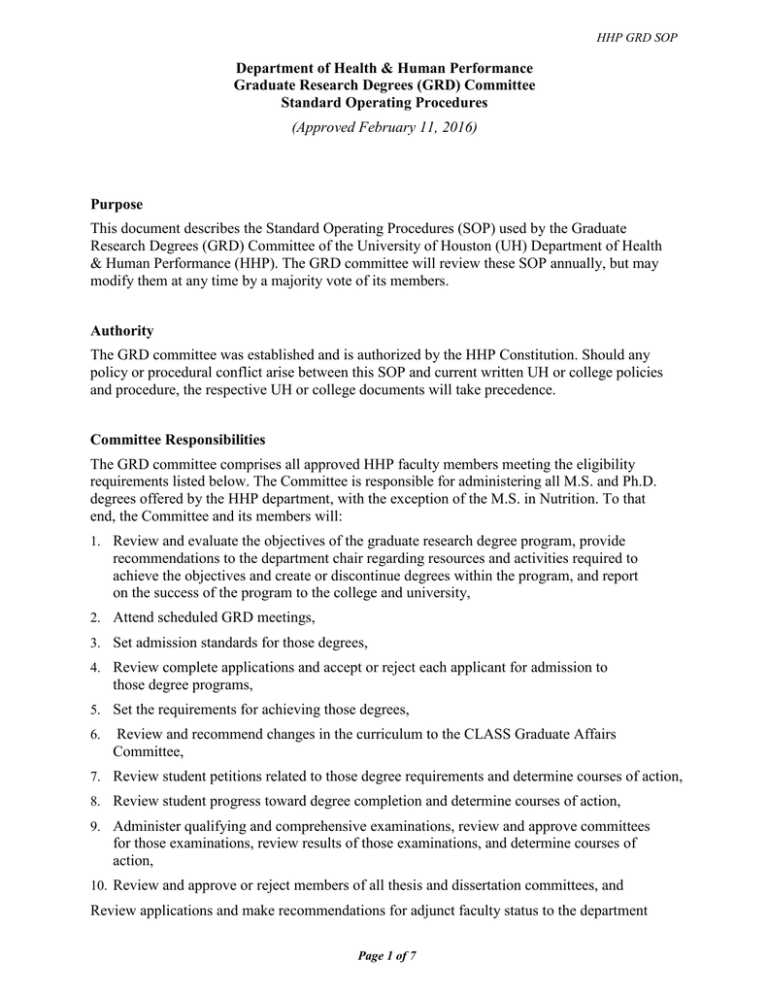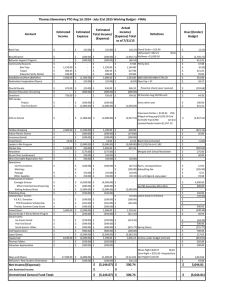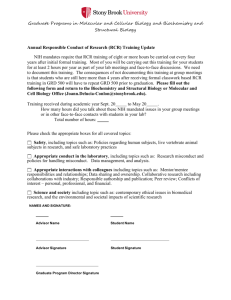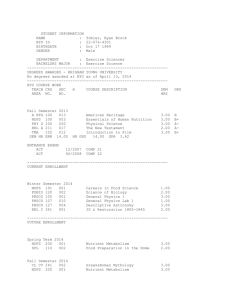Department of Health & Human Performance Graduate Research Degrees (GRD) Committee
advertisement

HHP GRD SOP Department of Health & Human Performance Graduate Research Degrees (GRD) Committee Standard Operating Procedures (Approved February 11, 2016) Purpose This document describes the Standard Operating Procedures (SOP) used by the Graduate Research Degrees (GRD) Committee of the University of Houston (UH) Department of Health & Human Performance (HHP). The GRD committee will review these SOP annually, but may modify them at any time by a majority vote of its members. Authority The GRD committee was established and is authorized by the HHP Constitution. Should any policy or procedural conflict arise between this SOP and current written UH or college policies and procedure, the respective UH or college documents will take precedence. Committee Responsibilities The GRD committee comprises all approved HHP faculty members meeting the eligibility requirements listed below. The Committee is responsible for administering all M.S. and Ph.D. degrees offered by the HHP department, with the exception of the M.S. in Nutrition. To that end, the Committee and its members will: 1. Review and evaluate the objectives of the graduate research degree program, provide recommendations to the department chair regarding resources and activities required to achieve the objectives and create or discontinue degrees within the program, and report on the success of the program to the college and university, 2. Attend scheduled GRD meetings, 3. Set admission standards for those degrees, 4. Review complete applications and accept or reject each applicant for admission to those degree programs, 5. Set the requirements for achieving those degrees, 6. Review and recommend changes in the curriculum to the CLASS Graduate Affairs Committee, 7. Review student petitions related to those degree requirements and determine courses of action, 8. Review student progress toward degree completion and determine courses of action, 9. Administer qualifying and comprehensive examinations, review and approve committees for those examinations, review results of those examinations, and determine courses of action, 10. Review and approve or reject members of all thesis and dissertation committees, and Review applications and make recommendations for adjunct faculty status to the department Page 1 of 7 HHP GRD SOP Chair when the adjunct duties are related to delivering teaching, research, or other aspects of those degrees. Committee Membership Any faculty member meeting the eligibility requirements listed below may apply to become a member of the GRD committee following formal review of their supporting evidence. The formal review should include a current CV listing all refereed journal articles, grant proposal submissions, and external research presentations, a list of graduate courses taught, as well as a list of graduate students for whom he/she serves as primary advisor. One doctoral-level graduate student who meets the eligibility requirement will also be on the committee. Review Process New member applicants may submit their supporting materials to the GRD committee Chair at any time during the school year. The Chair, or a designated subcommittee, will review the evidence submitted within one month and present the results to the full GRD committee at its next regularly scheduled meeting. A majority of the committee membership must approve the application for membership to be granted. Membership begins immediately following approval of the application. Continuing (or Active) members must submit their supporting materials to the GRD committee Chair by the first of September each year. The Chair, or a designated subcommittee, will review the evidence submitted and present the results to the full GRD committee no later than its October meeting. (Note that no GRD committee Chair or subcommittee member may review her/his own evidence. Instead, a tenured member of the GRD committee must be elected by the GRD to review the GRD committee Chair’s evidence, and members of the designated subcommittee must recuse themselves from participating in any review of their personal evidence.) No vote is required to retain membership for those meeting the eligibility requirements. However, should a continuing member fail to satisfy all of the eligibility requirements, a majority vote of the GRD committee membership is required to either remove that member from the GRD committee or to allow continued membership, which may include a probationary status and action plan. Any member removed from the GRD committee as a result of the annual review will be allowed to continue chairing any graduate committees that were approved prior to removal. The rights and responsibilities associated with GRD membership as they pertain to chairing a dissertation/thesis committee will continue for this individual until the particular student has graduated. Any former GRD committee member may reapply as a new member if, and when, s/he meets the eligibility requirements. New Member Eligibility Requirements: To become a new member of the GRD committee, a faculty member must: 1. Hold a tenured or tenure-track faculty appointment with voting privileges in HHP, 2. Demonstrate evidence of active involvement in one or more of the degree programs administered by the GRD committee, 3. Demonstrate evidence of an ongoing, focused research agenda through recently (within past two years) published refereed journal articles, grant proposal submissions, or external research presentations, and 4. Demonstrate evidence of having served as Chair or Co-Chair of a successfully completed Doctoral dissertation or Master’s thesis committee at UH or at another academic/research institution. Continuing Member Eligibility Requirements: Page 2 of 7 HHP GRD SOP To maintain continued membership on the GRD committee, a current member must: 1. Meet all the new member eligibility requirements, 2. Have been an active primary advisor to at least one graduate student in a degree program administered by the GRD committee in the previous review cycle, and 3. Have attended at least two-thirds (2/3) of all scheduled GRD committee meetings in the preceding academic year (or since becoming a member in the preceding year), unless a period of formal leave from the university has been granted. Committee Chair Any member of the GRD committee having at least two years of experience as a member of the GRD committee is eligible to run for GRD committee Chair. The Chair serves for a two-year term, being elected following open nominations from the floor at the September meeting of every even-numbered academic year. The candidate receiving the largest number of votes from those present at that meeting becomes the new Chair. In the event a Chair leaves, the Vice Chair will serve the remainder of the term as Chair. The Vice Chair will also chair any GRD meeting which the Chair is unable to attend. Vice Chair Any member of the GRD committee having at least two years of experience as a member of the GRD committee is eligible to run for GRD Vice Chair. The Vice Chair serves for a two-year term, being elected following open nominations from the floor at the September meeting of every even-numbered academic year. The candidate receiving the largest number of votes from those present at that meeting becomes the new Vice Chair. In the event a Chair leaves and the Vice Chair becomes Chair, the committee will nominate and vote on a replacement Vice Chair to serve the remainder of the term. GRD Student Representative The role of the GRD committee student representative will be to organize monthly meetings with the graduate students and report student issues to the GRD committee. The student representative will be a non-voting member and, at the discretion of the GRD committee chair, may be excused from committee meetings when certain agenda items are being discussed. The student representative and one student alternate shall be appointed for one-year terms coinciding with the academic year. Eligible, full-time graduate students in the Department of Health and Human Performance will be nominated by their peers or through self-nomination to serve on the GRD committee. To be eligible, the graduate student must be in good standing and have been enrolled in the degree for at least 12 months. The students will hold an election and a majority of the ballots cast must be received for the nominee to be elected. A quorum for the GRD committee student representative election must include a minimum of 50% of the full-time graduate students in the Department of Health and Human Performance. Standing Subcommittees To facilitate the work of the GRD committee, four standing subcommittees have been Page 3 of 7 HHP GRD SOP established. Subcommittee members must be active GRD committee members, and members may serve on more than one subcommittee. Subcommittees may meet face to face or electronically as needed to accomplish their work in a timely fashion. 1. GRD Membership Subcommittee: Three members elected by the GRD committee for one-year terms at the first meeting of each school year. The subcommittee reviews the evidence of eligibility provided by all continuing committee members at the beginning of each school year and by applicants for new member status as they are received. The subcommittee also makes recommendations for formal votes at the regularly scheduled committee meetings. 2. Student Application Subcommittee: One member from each of the graduate degrees program areas elected by the GRD committee for one-year terms at the first meeting of each school year. The subcommittee works with the graduate advisor to review student application packages as they are received. The subcommittee will also make recommendations for formal votes at the regularly scheduled GRD committee meetings and/or through the online voting site. 3. Student Petitions Subcommittee: Two members elected by the GRD committee for one- year terms at the first meeting of each school year. The subcommittee works with the Chair to review student petitions as they are received throughout the year. The subcommittee makes recommendations for disposition and formal votes at the regularly scheduled committee meetings. 4. Independent Study Review Subcommittee: Three members elected by the GRD committee for one-year terms at the first meeting of each school year. The subcommittee works with individual faculty members to develop Independent Study courses that meet or exceed minimum HHP graduate course criteria. The subcommittee also reviews syllabi for Independent Study courses before students enroll, and makes recommendations at the regularly scheduled committee meetings and/or electronically regarding acceptability of the proposed course based on minimum HHP graduate course criteria. a. Minimum HHP Graduate Course Criteria i. Syllabus provided to the student upon the first week of class ii. Syllabus outlines the following information: 1. Instructor contact information 2. Course description (general content and activities) 3. Learning objectives (knowledge or skills to be acquired) 4. Course prerequisites 5. Required learning resources 6. Optional learning resources 7. Evaluation plan (how will learning objectives be evaluated and weight of each assessment method) 8. General timeline b. The workload is such that the average student could satisfactorily achieve all learning objectives with the given learning resources in 6-10 hours per week for a 15 week semester. Page 4 of 7 HHP GRD SOP Committee Voting Procedures All votes will be conducted either during GRD Committee meetings or electronically (except subcommittee voting). The GRD committee will agree upon whether to vote during a meeting or through the online site for each voting issue. No business may be conducted and no votes may be held unless a quorum (50% of active members) is present in the meeting or casts a vote through the online voting site. All GRD committee votes except those regarding membership are decided by the number of votes cast by the members of the GRD committee present at time of voting, with a simple majority of the total voting members. Votes regarding committee membership require a majority of the entire membership to pass. Votes should be open unless there is majority agreement for a secret (by paper ballot) vote. Administration of Research Degrees Admissions Admission to any of the HHP graduate research programs is based on review of an appropriate series of success indicators, including undergraduate courses and degree plan, GPA, GRE scores, TOEFL, statement of research interests/goals, writing sample, letters of recommendation, and a resume. Applicants must also secure a commitment from a member of the GRD committee to serve as the applicant’s primary advisor prior to formal approval for admission. The GRD committee will admit a student to one of the HHP graduate research programs only after a thorough review of the application materials and a vote in support of acceptance. General Petitions General petitions may be submitted by students in HHP graduate research programs to request changes in program requirements, changes in advisor, transfers into different programs, leaves of absence, and other program-related issues. These petitions must be signed by the advisor, and if necessary, will be forwarded to the Chair of the GRD Committee for disposition. The Chair, or a designated subcommittee, will review the petition, consult with the student’s advisor, and recommend a course of action to the full GRD committee for a vote at its next regularly scheduled meeting. Doctoral Qualifying Examination At the end of the first academic year, a Ph.D. student will be required to take the Qualifying Exam. This written examination will be administered within the department based on a book or number of short essays, which will be communicated to the student at the beginning of the semester in which they sit for the examination. The GRD committee will review the readings and approve them by a majority vote prior to their distribution. This examination is designed to assess the critical thinking and writing skills of the student, skills that the student will have been expected to begin developing as part of the educational experience supplied in the firstyear doctoral coursework and continue to develop during the period they have to review the readings supplied to them. The questions posed in the examination will be formulated by an external testing entity, approved by the GRD committee, and be based on general conceptual themes appearing in the readings. The examination will be graded by the testing entity external to the university who is identified by the GRD committee and will be of a PASS/FAIL nature. The grades will be reviewed and approved by the GRD committee before distribution to the examinees. A student must receive a PASS grade in their Qualifying Exam to continue in the Ph.D. Page 5 of 7 HHP GRD SOP program. Any student that does not receive a PASS grade on the first attempt will be given the opportunity to retake the qualifying examination in the Summer semester after being supplied an additional series of short essays. The second examination attempt will be administered in the same manner as the initial attempt. A student that receives a FAIL grade on their second attempt of the Qualifying Exam will be immediately dismissed from the Ph.D. program. Candidacy Paper Requirements Each Ph.D. student is required to complete a candidacy paper, which is a scientific article based on a study designed and carried out by the student while enrolled in the Ph.D. program under the guidance of a member of the GRD committee. The article will be submitted to a peerreviewed journal. The student’s advisor will be responsible for identifying two or more independent readers for the student’s candidacy paper. Readers need not be members of the GRD. The advisor must submit the names of the proposed readers to the GRD committee, who must vote to approve the candidacy paper readers prior to the review. Fulfillment of candidacy paper requirement consists of providing evidence of the manuscript’s submission to a peerreviewed journal to the committee by the student’s advisor and that the student has first authorship. Doctoral Comprehensive Examinations A student is eligible to sit for comprehensive examinations after the candidacy paper has been submitted and at least 36 hours of coursework including all of the Ph.D. core courses have been completed. Each Ph.D. student is required to pass a comprehensive examination, which is a written exam representing the knowledge and skills in his/her area of specialization and practical knowledge as an independent researcher. A student’s advisor will be responsible for the process of collecting questions from each faculty member tasked with writing comprehensive examination questions, collecting the graded examination, compiling the final grade for the examination and communicating this grade to GRD committee. The GRD committee (based on the information supplied by the Advisor) will have final authority to recommend a pass or fail grade on the exam. A student’s advisor is responsible for identifying faculty members to assist him or her in writing the student’s comprehensive exam questions. Those faculty members who contribute questions must also serve as readers for those questions. Faculty members may serve as reader for more than one question for each examination and need not be members of the GRD committee. The advisor must request approval of the examination team members from the GRD committee who must vote to approve the team prior to the exams. To ensure the examination tests both broad and specific content at a level appropriate to the student’s degree and career focus, at least four approved faculty members including the advisor should participate in this process. Doctoral comprehensive exams are administered via computer within the physical location of HHP unless otherwise requested by petition and approved by the GRD committee. Each student’s academic advisor is responsible for proctoring her or his doctoral comprehensive exam, although an advisor may make alternate arrangements with other HHP faculty members to serve as proctor. PASS/FAIL decisions on all comprehensive exams are ultimately the decision of the GRD committee, who will vote on the issue once a grade has been communicated to the GRD committee by the student’s advisor. Once the GRD committee has reviewed and accepted the results of the comprehensive exam, the Chair of the GRD committee will formally notify the student of the outcome. The student’s advisor is authorized to informally notify the student of the outcome following the GRD committee vote. Page 6 of 7 HHP GRD SOP If a student fails the comprehensive doctoral examination, then the advisor must submit a remediation plan for that student for approval by the GRD committee. The contents of this plan are the responsibility of the advisor. Once approved, the advisor must document that the student has reviewed and understood the remedial course of action. If a student fails to complete the remedial plan within its specified time frame or fails the second attempt at the comprehensive examination, the student will be dismissed from the Ph.D. program. Graduate Student Thesis/Dissertation Committee PhD students are eligible to form a dissertation committee after passing the comprehensive examination; MS students are eligible to form a thesis committee after completing their core coursework in the degree. A student’s advisor is responsible for identifying thesis/dissertation committee members for her or his student. The advisor must submit the list of proposed thesis/dissertation committee members to the GRD committee who must vote to approve the thesis/dissertation committee prior to engaging them in mentoring/advising activities. Once the thesis/dissertation committee is assembled, the Advisor will notify the GRD committee in a memorandum indicating all members of the thesis/dissertation committee, the student’s name and the title of the dissertation/thesis project. Once a thesis/dissertation committee has been formed and approved, the student must prepare and orally defend a thesis/dissertation proposal. The title, abstract, location, time and date of the defense must be announced to all HHP faculty members via electronic memorandum at least 10 working days prior to the defense. Upon successful completion of the proposal defense, the student may begin carrying out the thesis/dissertation project. Once the student completes the thesis/dissertation project, s/he is responsible for preparing a thesis/dissertation document for approval by the thesis/dissertation committee. Once the thesis/dissertation committee has approved the thesis/dissertation document, the student must prepare for and defend a thesis/dissertation in a public forum. The title, abstract, location, time and date of the defense must be announced to all HHP faculty members and the public via memorandum at least 7 working days prior to the defense. Upon successful completion of the thesis/dissertation defense, the student must complete any final corrections to the document, obtain signatures of all committee members and submit the requisite copies to the College. Graduate Student Annual Review and Progress Reports All GRD committee members are responsible for carrying out an annual review on each of their graduate students in order to assess and report the progress of each student toward completion of their degree. This process will be completed annually at the end of every spring semester. The culmination of this review will be a report presented to the GRD committee that details the classes (including core degree requirements) the student has completed/enrolled in, research projects in which the student has been involved, student-authored publications or presentations, where the student is in the degree progress (i.e., candidacy paper, advancement to candidacy, degree plan filed, comprehensive exams, dissertation proposal, etc.), advisor’s assessment of the student’s achievements and rate of progress toward the Ph.D to date and feedback from the student on their perception of their own progress towards completion of their degree. Upon completion of the annual review process a student will be placed in one of three categories: (a) making adequate progress towards the degree; (b) probationary status; (c) terminated from the graduate program. The advisor will be responsible for determining whether the student is making adequate progress toward completion of her or his degree. If an advisor deems that a student should be placed in either probationary status or terminated from the graduate program, then the advisor will provide a rationale to the GRD committee for her or his Page 7 of 7 HHP GRD SOP decision, including those steps deemed necessary by the advisor to have a student removed from probationary status and returned to good standing within the graduate program. As the GRD committee is ultimately responsible for all student admissions to the M.S. and Ph.D. programs, with the exception of the M.S. in Nutrition, the final decision on a student’s status within the program will be the subject of a committee discussion and vote. Graduate Student Advisor Change A student wishing to transfer advisors within the graduate program must submit a General Petition for “change of advisor” to the GRD committee for approval. An Advisor who wishes to terminate her or his service as a student’s advisor without the student’s consent must explain the decision to the GRD committee, who will then attempt to find a new advisor for the student. Should no other faculty members agree to serve as their advisor, the student will be terminated from the program. Ancillary Functions of the GRD Committee Recommend Adjunct Faculty The GRD committee may recommend to the Chair of the Department certain individuals for Adjunct Faculty status in the Department. These individuals will play a significant role in graduate research and education within HHP, such as serving as dissertation/thesis committee members, serving as Readers on candidacy papers and doctoral comprehensive examinations or expanding the research opportunities available for our graduate students. However, Adjunct Faculty cannot serve as chairs of dissertation/thesis committees, doctoral comprehensive exams, or candidacy projects. Page 8 of 7




